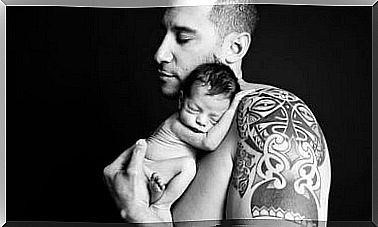Perinatal Grief: A Mother’s Grief

Since your belly turned into a crib, you’ve been dying of love and anxiety reigns. But, often, life gives us hard slaps to overcome. This is the case of those who face perinatal grief, a loss that transcends simple statistics and implies a deeply painful experience for the mother.
The death of the fetus during pregnancy is a delicate issue as it triggers pain and feelings that are subdued and give rise to psychiatric disorders. Knowing the consequences of perinatal grief from the perspective of the parents is useful to understand the meaning attributed to this loss.
Therefore, in this article we will deal with those aspects that transform perinatal grief into the most painful suffering of any mother and that are still unknown or ignored by people who have never faced such a loss.
Perinatal grief: what is it?
Perinatal and gestational grief are terms that refer to the death of a child during the period that includes conception, delivery and the baby’s first week of life.
Just thinking about this situation makes the blood run cold in your veins. Unfortunately, this type of loss tends to be ignored or silenced by people around, as they do not give much importance to what happened when, in fact, it is a grief as painful and inexplicable as any other.
Therefore, perinatal mourning is usually classified as “unauthorized mourning”. Behind these painful silent screams, the numbers show that this is a frequent reality: a year, 10,265 abortions are registered. An unimportant fact, except for the parents who planned a life with these babies.
Perinatal Grief: Painful Details Many Ignore
When the child dies inside the mother’s womb, many parents receive the news at the time of the ultrasound. The professional gives them the news and then leaves them alone. Soon will come one of the most shocking parts: “the delivery” of the baby, which parents have no option to choose how to do.
The worst thing is that there is no legislation about this practice in any part of the world, so sometimes the medical insurance turns its back and refuses to cover certain services for the deceased baby. Also, if the parents don’t have the money to pay a funeral home, it turns into hospital waste.

Another very sad issue for every mother who deals with perinatal grief is that, as the child was stillborn, she has no right to a name or surname, being considered “no name”. And what’s worse: her death certificate is issued in her mother’s name. A cruel paradox, dead in life.
What do many parents find most painful? To place the baby’s mother in the maternity ward, where she will be in contact with many situations that will bring suffering, such as the crying of other babies, and will be inserted in an environment marked by the joy of others while everything she sees is gray.
Spain is an exemplary case. Even though there are newer maternity hospitals that continue to ignore this situation, in more advanced hospitals a “mourning space” was created on the maternity floor, in order to avoid contact between parents who had their babies and those who have just lost their children.
Overcoming perinatal grief
In perinatal mourning, life and death coexist in the same process, leaving a space empty of memories. Experts recommend choosing a space to help fill in these memories, a box, for example, where you can gather things that remind your child : ultrasounds and symbolic objects that confirm the mourning and comfort your pain.
Other experts stress the importance of holding a farewell ceremony. Even though in these cases it is sometimes not possible to carry out a funeral or burial, it is possible to prepare a symbolic farewell act. You can go to a special place, write something meaningful, or perform a representative gesture such as planting a tree.
Regarding grief minimized by the surrounding environment, each parent needs to reflect to try to understand how they can put their pain in gestures or words in order to support and overcome the grief. The mother is often overmedicated with medications that can prevent or delay her period of mourning.

the awakening of society
Did you know that millions of babies die every year around the world leaving millions of families desolate? Even, according to statistical data, the numbers of cases of intrauterine death exceed those of death from HIV and malaria together. Losses caused by perinatal grief, in turn, produce psychological effects that can last for decades.
Did you know that, even today, there is still no work to raise awareness in society about perinatal death? That’s why nobody talks about babies who die in the womb. Any grief is a natural process that occurs after a loss, but perinatal grief has specific characteristics that make it different.
However, they are unauthorized mournings, ignored and minimized. This means that, on many occasions, perinatal or gestational mourning is not publicly recognized or socially expressed. The awakening of society will happen when there are no more muffled screams or silent mourning.









